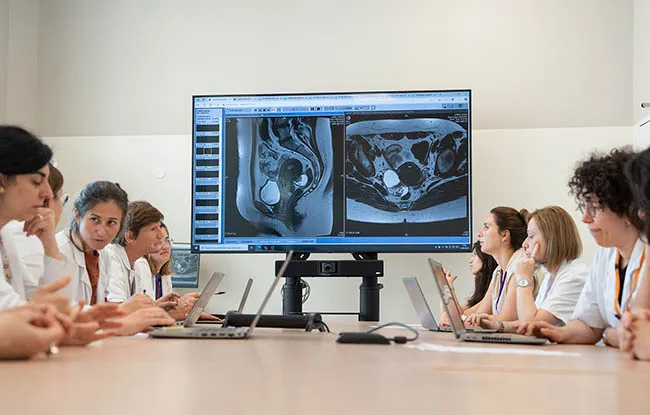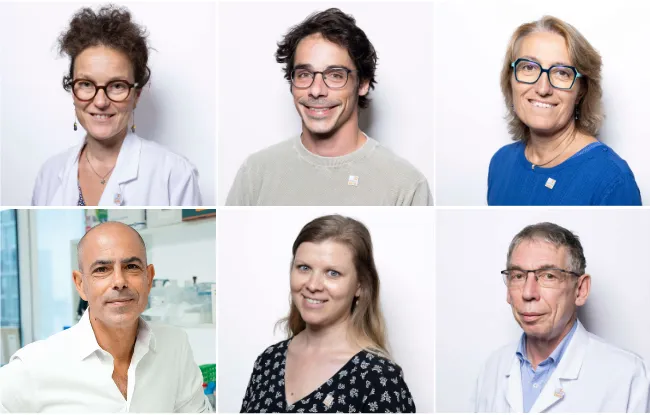- Home >
- Institut Curie News >
- Institut Curie mobilizes to prevent, understand and treat gynecological cancers
On the occasion of Turquoise September, Institut Curie reaffirms its commitment to tackling gynecological cancers. With nearly 18,000 women affected each year in France, these cancers encompass a wide range of complex pathologies requiring coordinated, personalized treatment. At the heart of Institut Curie and the IHU Institute of Women’s Cancers, research and care teams work together to improve diagnosis, strengthen prevention, and guarantee tailored support for every patient.
Gynecological cancers—cervix, endometrium, ovary, vulva, vagina, fallopian tubes—affect almost 18,000 women and cause about 7,000 deaths annually in France. They most often occur after the age of 50, but can also strike younger women. Their presentation varies significantly depending on location and they are often diagnosed late. These complex, under-recognized cancers pose a major public health challenge, requiring innovative approaches to both prevention and treatment.
As Europe’s leading center for women’s cancer treatment, Institut Curie treats almost 1,800 women with gynecological cancers each year. In 2024, Institut Curie created the IHU (Institut hospitalo-universitaire) Institute of Women’s Cancers with PSL University and Inserm, with an ambitious goal: to advance precision medicine by accounting for each woman’s unique pathways, needs and experiences.
By bringing together researchers, caregivers and patient associations, the IHU unites expertise to prevent relapses, identify new levers for action—particularly in prevention and HPV vaccination—and extend the reach of innovations to all women affected.
Tailored care and support for patients
At every stage of the treatment journey, Institut Curie’s organization aims for fluidity, responsiveness and clarity, while taking into account the specific needs of each patient: age, medical history, vulnerability or particular circumstances. Tailored care pathways are offered to both younger and older women. This customized approach is coordinated by a dedicated multidisciplinary team, including a coordinating nurse, a pathway assistant and specialist experts in surgery, oncology (with access to clinical trials when relevant), radiotherapy, Curietherapy, radiology, pathology, genetics and supportive care).
Optimization of gynecological cancer treatment at Institut Curie—recognized as an expert center in this field—is exemplified by new dedicated operating rooms at the Saint-Cloud site.
Innovating for better care
Teams at Institut Curie and the IHU Institute of Women’s Cancers are investing in original research and cutting-edge technologies to understand the origins and biology of gynecological cancers, and to develop new diagnostic and therapeutic approaches. One flagship project is a platform for developing 3D organoids and tumors-on-a-chip. Based on “biological avatars of patients,” this platform will allow testing of tumor responses to various treatments and tracking their evolution.
Another major cross-disciplinary initiative is the Women’s Cancer Atlas: a centralized, multi-scale, multimodal database covering everything from molecular and clinical parameters to social science data. This resource will become invaluable for researchers and physicians. Eventually, it will also inform Artificial Intelligence (AI) algorithms—a field in which Institut Curie is a pioneer. Using radiology, digital pathology and multi-omics data (genomics, transcriptomics, metabolomics, etc.), researchers are developing promising AI models for diagnosis, relapse prediction, and practical personalized clinical tools for women.
Providing information and support: Institut Curie alongside patient associations
Throughout September 2025, Institut Curie is organizing and supporting information workshops in partnership with associations such as IMAGYN and Mon réseau cancer gynéco. These initiatives aim to support women affected by gynecological cancers, disseminate reliable information, and encourage open discussion about disease, treatment and quality of life.
Candice J 51 years old



